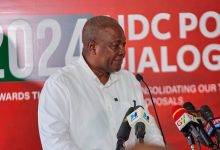
The Commission
on Human Rights and Administrative Justice (CHRAJ), has chastised Parliament,
accusing it of failing in its oversight mandate in the implementation of the
National Anti-Corruption Action Plan (NACAP).
It bemoaned that the House had not shown the
needed muscle to ensure the smooth implementation of the plan to curb the
canker of corruption which the plan was geared towards in helping to intensify
the fight against corruption and the promotion of national development.
The plan contains strategic action plans
identified and agreed upon by stakeholders, including the private sector,
during nationwide consultations.
According to
Richard Quayson, the Deputy Commissioner of CHRAJ made the observation at a
forum of the African Parliamentarians Network Against Corruption (APNAC).
He wondered why Parliament spent two years to
look at the anti-corruption strategy and approved it and now, when it was
necessary for them to provide the oversight for its implementation and not felt
as the citizenry should.
“The body that CHRAJ reports to is Parliament, I
will never stand anywhere and make statements that are uncomplimentary of the
body I report to but I also cannot run away from the truth since the country’s
performance on the Transparency International corruption perception index
increased by a point to 41 in 2018, from its 2017 score of 40 which left with a
ranking of 78 out of 180 countries, an improvement from 2017 rank of 81,”
Mr Quayson noted.
Ghana has averaged 38.75 points from 1998 until
2017, reaching an all-time high of 48 points in 2014 and a record low of 33
Points in 1999.
The latest Afrobarometer report released by the
Center for Democratic Development shows that among key public officials in the
nation, the police, judges and magistrates, Members of Parliament, civil
servants, and tax officials are most widely perceived as corrupt.
The report also indicated that the government was
rather performing poorly to fight the canker and revealed that the government’s
anti-corruption efforts had declined sharply since 2017 after more than
doubling three years ago and the survey also showed that the Army, religious
leaders, and the presidency are seen as the most trusted public institutions
while opposition political parties, local government officials and tax
officials are least trusted. -citinewsroom.com





